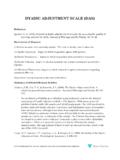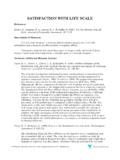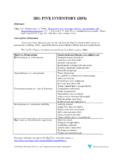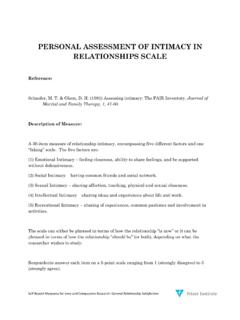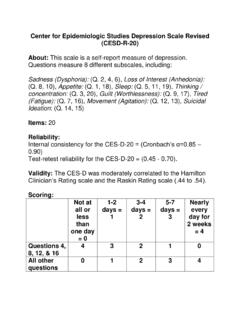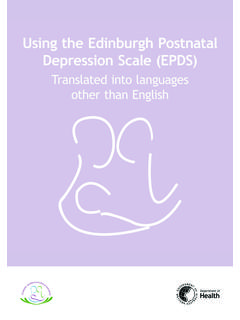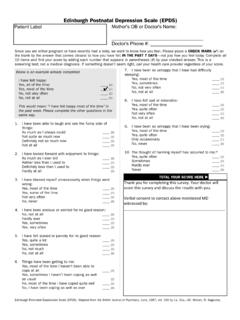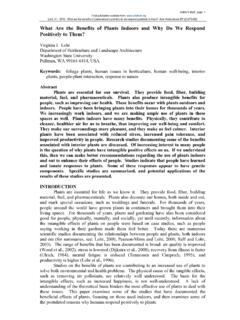Transcription of UCLA LONELINESS SCALE - Fetzer Institute
1 UCLA LONELINESS SCALE . Reference: Russell, D , Peplau, L. & Ferguson, M. L. (1978). Developing a measure of LONELINESS . Journal of Personality Assessment, 42, 290-294. Description of Measure: A 20-item SCALE designed to measure one's subjective feelings of LONELINESS as well as feelings of social isolation. Participants rate each item as either O ( I often feel this way ), S ( I sometimes feel this way ), R ( I rarely feel this way ), N ( I never feel this way ). The measure has been revised two times since its first publication; once to create reverse scored items, and once to simplify the wording. (See other UCLA LONELINESS SCALE pages on the site). Abstracts of Selected Related Articles: Russell, D , Peplau, L. , & Cutrona, C.
2 E. (1980). The Revised UCLA LONELINESS SCALE : Concurrent and discriminate validity evidence. Journal of Personality and Social Psychology, 39, 472-480. The development of an adequate assessment instrument is a necessary prerequisite for social psychological research on LONELINESS . Two studies provide methodological refinement in the measurement of LONELINESS . Study 1 presents a revised version of the self-report UCLA (University of California, Los Angeles) LONELINESS SCALE , designed to counter the possible effects of response bias in the original SCALE , and reports concurrent validity evidence for the revised measure. Study 2 demonstrates that although LONELINESS is correlated with measures of negative affect, social risk taking, and affiliative tendencies, it is nonetheless a distinct psychological experience.
3 Russell, D. (1996). UCLA LONELINESS SCALE (Version 3): Reliability, validity, and factor structure. Journal of Personality Assessment, 66, 20-40. In this article I evaluated the psychometric properties of the UCLA LONELINESS SCALE (Version 3). Using data from prior studies of college students: nurses, teachers, and the elderly, analyses of the reliability, validity, and factor structure of this new version of the UCLA LONELINESS SCALE were conducted. Results indicated that the measure was highly reliable, both in terms of internal consistency (coefficient a ranging from .89 to .94) and test-retest reliability over a 1-year period (r = .73). Convergent validity for the SCALE was indicated by significant correlations with other measures of LONELINESS .
4 Construct validity was supported by significant relations with measures of the adequacy of the individual's interpersonal relationships, and by correlations between LONELINESS and measures of health and well-being. Confirmatory factor analyses indicated that a model incorporating a global bipolar LONELINESS factor along with two method factors reflecting direction of item wording provided a very good fit to the data across samples. Implications of these results for future measurement research on LONELINESS are discussed. Self Report Measures for Love and Compassion Research: LONELINESS and Interpersonal Problems Weeks, D. G., Michela, J. L., Peplau, L. A., & Bragg, M. E. (1980). Relation between LONELINESS and depression: A structural equation analysis.
5 Journal of Personality and Social Psychology, 39,1238-1244. Research on LONELINESS has been hampered by its strong association with depression. The 2 states frequently co-occur, and measures of the 2 states are substantially correlated. Inability to manipulate experimentally LONELINESS or depression makes it difficult to untangle the causal influence of one on the other. The combination of longitudinal design and structural equation methodology is proposed as a solution to this general problem. Measures of LONELINESS and depression ( , the Beck Depression Inventory and Profile of Mood States) were administered to undergraduates at 2 points 5 wks apart. Data from 333 Ss were correlated and analyzed under a succession of structural equation models.
6 Results indicate that LONELINESS and depression were correlated but clearly different constructs; neither was a direct cause of the other, although both probably share some common origins; both were highly stable over the 5- wk period. SCALE : INSTRUCTIONS: Indicate how often each of the statements below is descriptive of you. C indicates I often feel this way . S indicates I sometimes feel this way . R indicates I rarely feel this way . N indicates I never feel this way . 1. I am unhappy doing so many things alone O S R N. 2. I have nobody to talk to O S R N. 3. I cannot tolerate being so alone O S R N. 4. I lack companionship O S R N. 5. I feel as if nobody really understands me O S R N. 6. I find myself waiting for people to call or write O S R N.
7 7. There is no one I can turn to O S R N. 8. I am no longer close to anyone O S R N. 9. My interests and ideas are not shared by those around me O S R N. 10. I feel left out O S R N. 11. I feel completely alone O S R N. 12. I am unable to reach out and communicate with those around me O S R N. 13. My social relationships are superficial O S R N. 14. I feel starved for company O S R N. 15. No one really knows me well O S R N. 16. I feel isolated from others O S R N. 17. I am unhappy being so withdrawn O S R N. 18. It is difficult for me to make friends O S R N. 19. I feel shut out and excluded by others O S R N. 20. People are around me but not with me O S R N. Scoring: Make all O's =3, all S's =2, all R's =1, and all N's =0.
8 Keep scoring continuous. Self Report Measures for Love and Compassion Research: LONELINESS and Interpersonal Problems

